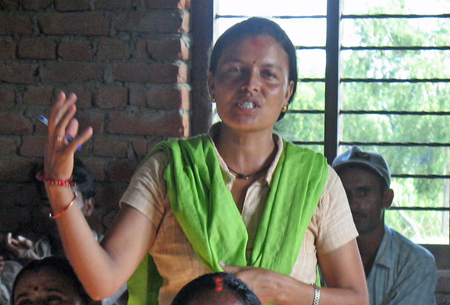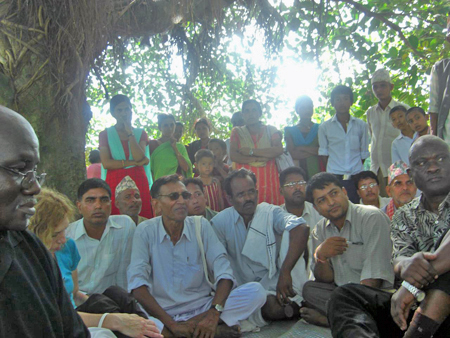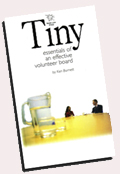
Nanda speaks out for her rights. Photo Dinesh Singh.
How Nanda found her voice in Nepal
by Ken Burnett
Fifteen years ago a charity like ActionAid might have given a landless Nepali labourer like Nanda a hoe and some seeds, with perhaps some agricultural training. Or it might have helped her to dig a well for her community or build a school for her children. Now, they have given her something much more powerful – a voice, and the opportunity to use it to change her and her family’s lives forever.
Listen to Nanda for a while. What she is saying is amazing. So is how she is saying it. But even more remarkable is that this semi-literate young woman is speaking out at all, in a packed public meeting with many men present. And that she is delivering her message with such power, determination and conviction. Having found her voice, Nanda will now settle for nothing less than using it to secure what is hers by right.
What Nanda is so agitated about is the traditional role of women in her village, and how they suffer. At the meeting where I met Nanda, in her village, Jamunia, southern Nepal, she spoke passionately and eloquently, detailing the everyday experience of Nepali village women – violent physical and sexual abuse, dowry contracts, child brides as young as seven. It’s not just domestic violence and exploitation in the home. In Jamunia women do the same hard labour for the local landowner as the men, but he pays the women just half of what the men get, for the same work. Today Nanda is telling us and her community that these wrongs will no longer be tolerated here and she ‘s explaining, in precise detail, what the women of Jamunia are doing to change this dreadful situation forever. The people of Nanda’s village might still appreciate some practical help from ActionAid with growing food, health and education, but much more important for them is that they should be able to organise together to articulate and claim their basic rights.
Just down the road from Nanda’s village is a huge dam built as a joint project between the Nepali government and the government of India, whose flood plains in Bihar benefit from the now regulated flow of river water from the high mountains of Nepal. But the dam doesn’t work properly and the Indians haven’t kept their part of the agreement to ensure that the dam is properly maintained and the waters flow evenly. So the Nepali farmers along the riverbanks are often denied water, or get too much when the malfunctioning dam causes floods. Under a spreading banyan tree in a village not dissimilar to Nanda’s, another meeting is taking place involving all the farmers displaced by the dam, men and women. There are many passionate speeches. One village leader, a dignified, articulate elderly gentleman known simply as the doctor, explains that some months back the farmers got together to mount a protest, cutting off the flow of water to India and filling the dry river bed with 60 or so of their number, as human shields. The Indian officials came to negotiate and made more promises, but still nothing is improved. So, this time, he says solemnly, it is ‘do or die’. The national Nepali media have now latched on to this story, which will elevate the campaign. The villagers are united, confident in the rightness and ultimate successful outcome of their campaign. These people are aware of their rights and are expecting change. They won’t stand for any reversal now.
Hunting tigers and elephants with a camera in the lush forests of nearby Chitwan National Park is a seminal tourist experience in Nepal. But when the Park was formed thirty years ago the government of the time simply dispossessed the traditional forest dwellers who had lived there for centuries. The park rangers then brutally suppressed dissent. Many villagers were imprisoned and some were killed. All lost their homes, their land and their traditional livelihoods in the forest. One group, the Bote (pronounced Bow-tay) are now fighting back effectively to regain their basic rights to land and livelihood that were taken from them a generation before. It’s a campaign not without risk for, like the dam project, it brings the tiny, fragile community into direct conflict with powerful, rich elites. But in the new Nepal’s fair and democratic society, this campaign too is getting results.
ActionAid and its community-based partners have enabled many people in this region and across Nepal to find their voices, to start campaigning for their rights. The achievements are often startling. Recently Nepal’s parliament outlawed the centuries-old tradition know as Kamiya – bonded labour amounting to slavery – which has imprisoned generations of families and communities, the poorest of Nepal’s poor, in servitude to rich landlords. Now a long campaign by a coalition of local and national NGOs has led to the Kamiya tradition being outlawed in Nepal forever.
If you have ever had something you thought was rightfully yours suddenly taken away, without warning or discussion – something that your or your family’s lives depended upon – then you’ll perhaps have some inkling of how strongly these people feel. They don’t want charity, they never did. They simply want to regain what should be theirs, by right. Helping them to achieve this transformation is infinitely more appropriate and fruitful than any amount of handouts or short-term services. Following the rights-based approach will, perhaps inevitably, lead to lasting social change. But then, we’re unlikely to have much impact on poverty, without it.
If British donors want to see results from their charitable giving, the rights-based approach now being practised by ActionAid and other international charities could be just the place to look for them.
© Ken Burnett 2008.
Ken Burnett is a member of the international board of ActionAid, but he writes this article in his private capacity. For more information go to http://www.kenburnett.com and http://www.actionaid.org

Dr Julius Spencer, left, board chair ActionAid Sierra Leone, and professor Uvie Igun, right, board chair ActionAid Nigeria, learn from village leaders in southern Nepal. Photo Dinesh Singh.
Winning the governance game
by Ken Burnett
I took my broken sandals to the shoe-mender across the road from my London flat. ‘These are unusual,’ he observed, when I gave them over. ‘They’re from Ghana’, I told him. ‘ I bought them from a street vendor in Accra for less than two pounds but they are the most comfortable shoes ever, leather throughout. Though, not stitched or glued very strongly.’ I saw that he’d noticed their earlier mends. ‘Yes, I responded to his query, one repair was done in Bangalore, India, the other in Kathmandu, Nepal.’
‘They’re expertly done’, he said with respect. ‘How do you get to travel to such a lot of exotic places?’ I explained that I am a member of the international board of trustees of ActionAid, the poverty fighting development charity. Each year at least two of our board meetings are hosted in different programme countries, so I get the chance to go somewhere far-flung and interesting. He looked at me incredulously, then a bit askance.
‘That sounds like quite a game’, he said. ‘These charities seem to have no end of fun spending their donors’ money organising meetings all over the place.’
It’s a natural criticism, not an unreasonable observation. Sometimes, it’s best to leave people with their preconceptions. But I know this guy, so I was happy to enlighten him.
‘You know,’ I said, ‘one of the biggest problems to overcome when fighting poverty is the often low standards of leadership and governance in developing countries. It’s a major cause of grief in many developed economies too, as we’ve all seen recently. But many poor countries lack the culture, capacity and traditions of good self-management. These are particularly essential characteristics in non-government organisations that are campaigning for human rights and lasting social change. So in ActionAid we’re investing in building governance capacity in all our countries worldwide.’
It’s a huge task, one that can’t be done on the cheap. Relative to other perhaps more tangible investments, such as delivering food aid, building schools, digging wells and such like, the outlay is small. But the effects are likely to be much deeper and longer lasting. Our aim is to create strong, competent, well-run, self-sustaining, independent national boards that are capable of determining their own local and national priorities within ActionAid’s broad strategy, Rights to end poverty.
ActionAid works in getting on for 50 countries around the world, from Afghanistan and Brazil to Zambia and Zimbabwe. In 2003 it was the first major international charity to shift its international headquarters from a base in the affluent North – London, to a capital in the global South – Johannesburg. Its chair of trustees is a Ugandan woman; its chief executive is an agriculturalist from Nepal. Seated around its top governance table now you’ll find representatives from national boards that ActionAid has created and is supporting in Malawi, Guatemala, India, Sierra Leone, Greece, Ghana, Denmark, USA, Australia, Uganda, Kenya, the UK and others. ActionAid’s international governance system enjoys all the colours of the rainbow and all the flavours of a Nepalese street market. Though it started in the UK, British trustees are determinedly and deliberately thin on the ground. At our most recent meeting there were more Indians and Brazilians than Brits.
Experience to date seems to indicate that ActionAid’s board does its job rather better now too. In many countries the new ActionAid boards have been able to secure top brains and experienced campaigners for change of a quality that would have been hard to find and attract if we’d only been fishing in British local waters. These new, developing trustees include many academics, politicians, business leaders, legal specialists and opinion formers.
But diversity brings better decisions by definition. In each country ActionAid’s new leaders know where the poverty is and what’s causing it, because they come from it and see it in their daily lives. It also brings credibility and acceptance too, as individual national ActionAids around the world are increasingly seen wherever they work as self-regulating independent members of a southern-led international family, not as agents of British or American influence. In today’s volatile international environment, this makes a huge difference.
But will this move increase the impact that ActionAid’s donors will have on reducing poverty? Without any doubt, it will. ActionAid’s response to poverty includes not just the traditional pillars of rights to education, health, land, food, water, livelihood, reproductive and women’s rights but also the right to sound democratic governance at all levels. By building exemplary boards at the country level ActionAid is sending a strong, consistent message to the people and political leaders of each country where it works – a message that proclaims the importance of sound, just and equitable governance. And will train new generations to recognise what good governance is, and does.
Will this really help make poverty history? Not immediately, perhaps. Rather, as I endeavoured to explain to my friend the cobbler, it requires persistence and substantial investment, starting now. But as my shoe purchase and their repairs showed, value for money in these countries is often of a different order of magnitude than we’d find closer to home. Building better governance is a large and important step on the right path. And the evidence already shows it is working.
© Ken Burnett 2008.
Ken Burnett is a member of the international board of ActionAid, but he writes this article in his private capacity. For more information go to http://www.kenburnett.com and http://www.actionaid.org
